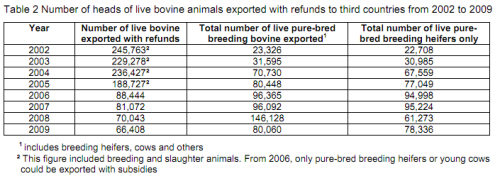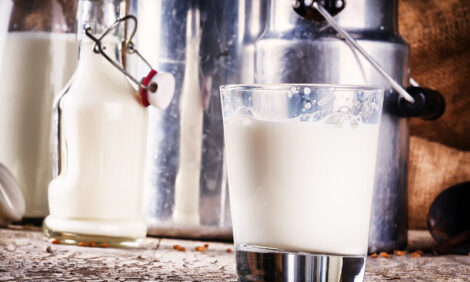



Bid To Ban Export Refunds For Live Cattle
Eurogroup for Animals is calling on the European Commission, the European Parliament and Member States to eliminate all subsidies for the export of live animals to third countries with immediate effect.Export refunds are used as a market measure to help producers cope with difficult market situation. They are one of the market instruments designed in the Common Agriculture Policy (CAP).
When the CAP was reviewed in 2003, the payment of export refunds for live cattle exported to third countries remained in place.
This mechanism encourages transport over long distances, with all the associated animal welfare problems.
Long distance transport is a source of welfare problems and sometimes high mortality. Overcrowding, inadequate ventilation, bad driving and failure to feed, water and rest the animals at correct intervals lead to unacceptable and unnecessary suffering.
Following several complaints from animal welfare organisations and the general public, the payment of export refunds is now subject to compliance with EU legislation on the protection of animals during transport.
However, EuroGroup states that the suffering continues because the legislation is inadequate and Member States (MS) are either reluctant or incapable of ensuring the correct implementation of the EU Rules on animal welfare during transport and the granting of export subsidies. Additionally, Member States have no competence to enforce animal welfare rules in third countries.


Legislation
Since 1998, the payment of export refunds is conditional to the respect of animal welfare rules, through compulsory checks at the point of exit from the Community, conducted by an official veterinarian. Checks on entry to the destination third country were only conducted if the means of transport changed or the exit veterinarian recommended it.
In 2003, as part of the drive of the Commission to ensure better enforcement of EU rules on the protection of animals during transport, new rules limited the payment of export refunds for slaughter cattle to consignments of animals sent to Egypt and the Lebanon.
Additionally, all female animals destined for breeding purposes had to be less than 30 months old. However, these rules did little to reduce the number of slaughter cattle exported to third countries, as most were exported to Egypt and Lebanon.
Rules on the common organisation of the market in beef and veal also cover live animals, and include general rules for trade with third countries making reference to the obligation for exporters to respect animal welfare legislation in order to receive export subsidies.
These provisions are now incorporated in Council Regulation on the common organisation of agricultural markets. The refunds are fixed by an implementing regulation, which is reviewed regularly, the latest being Regulation No 614/2011 of 23 June 2011. Following a decision by the European Commission in December 2005, export refunds are now only paid for live heifers or cows selected for breeding.
Since April 2003, export refunds are subjected to even tighter animal welfare requirements with the adoption of new rules which introduced reinforced checks on place of exit from the EU and at the place of unloading in third countries. An additional penalty – amounting to the total loss of refund for all animals indicated in the export declaration – is imposed if a given percentage or number of animals have died, given birth or aborted during transport, or fails to meet other inspection requirements.
These rules are currently set by Commission Regulation No 817/2010 laying down detailed rules pursuant to Council Regulation (EC) No 1234/2007 as regards requirements for the granting of export refunds related to the welfare of live bovine animals during transport.
Current Developments
Negotiations are on-going at the level of the World Trade Organisation (WTO), to reach a multilateral trade agreement. A decision was taken in Doha in 2001 to agree modalities for international trade on agricultural products and subsequently the Hong Kong declaration was adopted by WTO parties at the sixth ministerial conference on 18 December 2005, agreeing to ensure the parallel elimination of all forms of export subsidies by the end of 2013.
In that context, the European Commission also promised in December 2005 to completely stop export refunds by the end of 2013. At the same time, the then Commissioner for Agriculture Marianne Fisher-Boel agreed with the Member States to immediately stop all export refunds for live animals for slaughter.
However, despite the agreement on basic principles for the liberalisation of trade at Doha, no further agreement has been reached to date. The Commission has now stated that the commitments for the elimination of export refunds being conditional on other parties to commit to similar reductions, it has no intention at this moment to keep its promise.
In line with this statement, the draft legislative proposals for the Common Agriculture Policy after 2013 to be published in October 2011 still include the granting of refunds for exports of live pure-bred breeding cows and heifers.


